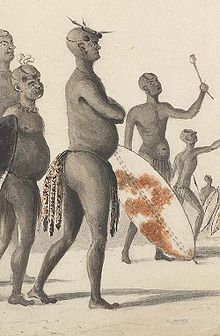- Mzilikazi
-
Mzilikazi Khumalo King of Matabeleland 
King Mzilikazi, as portrayed by Captain William Cornwallis Harris, circa 1836Reign ca. 1823 - 1868 Coronation ca. 1820 Born ca. 1790 Birthplace Mkuze, South Africa Died 9 September 1868 Place of death Matabeleland, buried in a cave at Entumbane, Matobo Hills, Zimbabwe (on 4 November 1868) Predecessor Founder (father murdered; formerly a lieutenant Zulu King Shaka) Successor Lobengula Consort several wives Offspring Lobengula (son), Nkulumane (son), and many others Royal House Khumalo; founder of the Ndebele people Father Matshobana KaMangete (c. late 1700s — c. 1820s), Mother Nompethu KaZwide, daughter of Chief Zwide of the Ndwandwe people (tribe). Mzilikazi (meaning The Great Road) (ca. 1790 - 9 September 1868), also sometimes called Mosilikatze, was a Southern African king who founded the Matabele kingdom (Mthwakazi), Matabeleland, in what became Rhodesia and is now Zimbabwe. He was born the son of Matshobana near Mkuze, Zululand (now part of South Africa) and died at Ingama, Matabeleland (near Bulawayo, Zimbabwe). Many consider him to be the greatest Southern African military leader after the Zulu king Shaka. In his autobiography, David Livingstone referred to him as the second most impressive leader he encountered on the African Continent.
Contents
Leaving Zululand
He took his tribe, the Khumalo, on an 800 km long journey from Zululand to what is now called Zimbabwe. Along the way he showed considerable statesmanship, as he was able to weld his own people and the many tribes he conquered into a large and ethnically diverse but centralised kingdom.
He was originally a lieutenant of Shaka, but in 1823 he had a quarrel with him and rebelled. Rather than face ritual execution, he fled northwards with his tribe. He first travelled to Mozambique but in 1826 he moved west into the Transvaal due to continued attacks by his enemies. As he conquered the Transvaal he absorbed many members of other tribes and established a military despotism, such as Mzilikazi's attacks in the Nzunza kraal at Esikhunjini, where the Nzunza king Magodongo and others were kidnapped and subsequently killed at Mkobola river. For the next ten years, Mzilikazi dominated the Transvaal. This period, known locally as the Mfecane (crushing) was characterised by devastation and murder on a grand scale as Mzilikazi removed all opposition and remodelled the territory to suit the new Ndebele order. He used the method of scorched earth to keep distance to all surrounding kingdoms. The death toll has never been satisfactorily determined but the region was so depopulated that the Trekboers were able to occupy and take ownership of all the best land in the 1830s due to the low population of the area.[1][2]
Meeting the Boers
The Boers began to arrive in Transvaal in 1836, and after several confrontations over the next two years the Ndebele suffered heavy losses. By early 1838, Mzilikazi was forced north across the Limpopo and out of Transvaal altogether. Further attacks first caused him to move west again to present-day Botswana and then later northwards towards what is now Zambia. He was unable to conquer the land there due to the prevalence of tsetse fly-borne diseases of oxen. Mzilikazi travelled southeastwards to what became known as Matabeleland (situated in the southwest of present-day Zimbabwe) and settled there in 1840..
After his arrival, he organised his followers into a military system with regimental kraals, similar to those of Shaka, which became strong enough to repel the Boer attacks of 1847 - 1851 and persuade the government of the South African Republic to sign a peace treaty with him in 1852.
Matabele Kingdom
While Mzilikazi was generally friendly to European travellers, he remained mindful of the danger they posed to his kingdom and in later years he refused some visitors any access to his realm. The many European travellers who met with Mzilikazi include Robert Moffat the missionary, David Hume the explorer / trader, Andrew Smith the medical doctor, ethnologist and zoologist, William Cornwallis Harris the hunter and the missionary explorer David Livingstone.
During the tribe's wanderings north of the Limpopo Mzilikazi became separated from the bulk of the tribe who gave him up for dead and hailed his young heir Nkulumane as successor. However, on his reappearance after a traumatic journey through the Zambezi valley, Mzilikazi asserted control and had his son and all those chiefs who had chosen him put to death. They were all executed by being cast over a steep cliff of a hill now called Ntabazinduna (Hill of the Chiefs). He made his capital 5 km away and named it Gu-Bulawayo which means "place of slaughter". King Shaka's capital was also called Bulawayo.[3][4]
References
Literature
External links
Categories:- 1790 births
- 1868 deaths
- Zulu kings
- 19th-century African people
Wikimedia Foundation. 2010.
